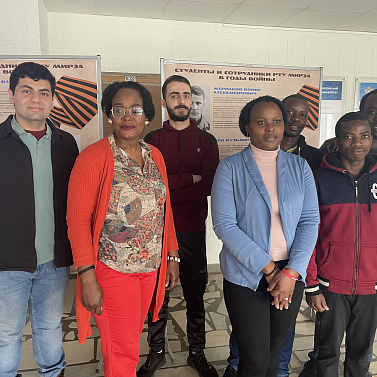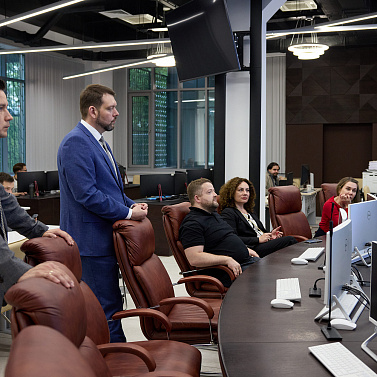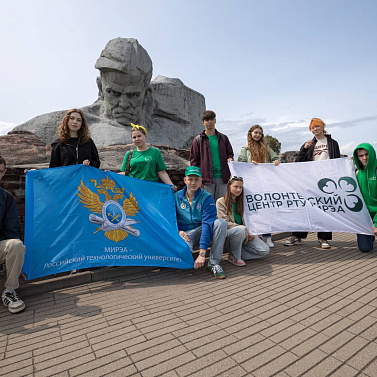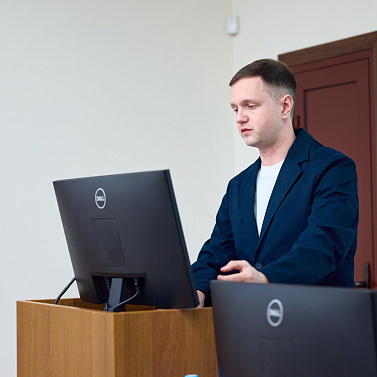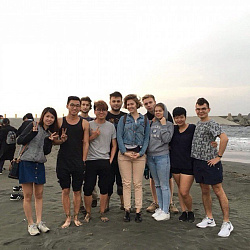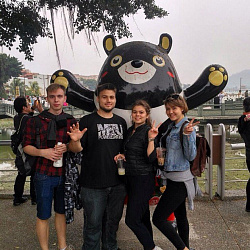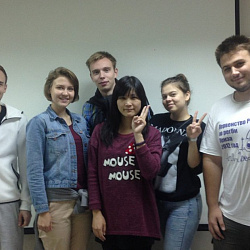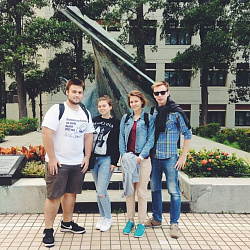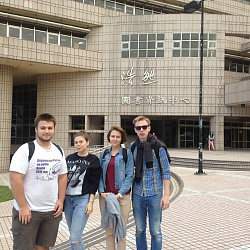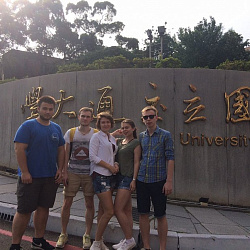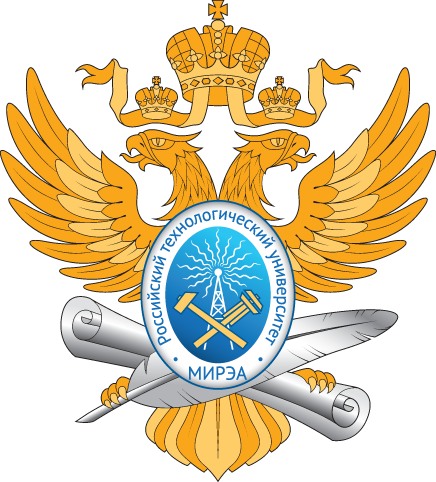University students share their experience in academic exchange program at National University of Chao Tong, Taiwan
19.02.2018
Recently, five students of our University have completed a six-month academic exchange program at the National University of Chao Tong, Hsinchu City in the north-west of Taiwan. We asked the students to tell us how they decided to travel to distant Asia, what they learned and why they advise everyone to use this opportunity.
The participants in our conversation were Anna Tretyakova (2nd year Master’s Degree student, direction "Technosphere safety"), Jeanne Samodurov (4th year undergraduate student, direction "Innovation"), Maxim Belousko (3rd year undergraduate student, direction "Software Engineering"), Pavel Belov and Yuri Alexeev (3rd year undergraduate students, direction "Optotechnics"). By the way, the guys were almost miraculously caught in Russia: the boys are going to Taiwan again to continue their studies until June.
How did you come to study abroad?
Yuri: I did not have a special task to take a program abroad. Once in VKontakte I saw a Moscow Technological University group post that an academic exchange program was opening in Taiwan. I decided to file documents, they accepted me, and I went.
Jeanne: I had a similar situation: I saw an ad on the Internet. It was said that the first year of the exchange program is with the University of Chao Tong, so our group turned out a trial. I found it interesting to exchange with Taiwan, because I wanted to learn Chinese, but nowhere else, except in the environment, it's good to learn the language. Initially, I had a basic level of Chinese through self-study.
Anna: I just studied, but at some point I realized that I had to go somewhere, do something, change something. I began to learn about exchange programs. At that time, two were proposed: in Italy (Milan) and Taiwan. Of course, I chose Milan. Well, not Asia! (laughing). There are some hieroglyphs, everyone speaks Chinese, why should I go there at all? Luckily, I changed my mind in time.
Pavel: We did not know each other in the beginning. Each of us made a decision about the trip independently, and only in Taiwan we got acquainted and became friends.
Did you need any additional preparation before the trip, for example, the language?
Jeanne: There was a choice: to master the program in English or in Chinese. But we chose English, because we did not know Chinese at a sufficient level. I spent most of my life studying English with a tutor. Thanks to this training, I successfully completed my courses in Taiwan. At first it was difficult. We all have a technical direction, so we came across with a huge amount of special vocabulary. We had to spend a lot of time translating the lectures, but after a month and a half we adapted.
Yuri: I independently developed the language proficiency, a little "pumped" my level for this trip, but did not do anything particularly. Just, as always, I studied English.
Maxim: They have a requirement: all literature should be in English, even if the course is conducted in Chinese. I believe that this is very correct, because 70% of all technical literature is published in English. You do not need to wait for translations, because even in this short time the information becomes obsolete.
What is the difference between the educational process and the content of education in Taiwan University and the Russian one?
Yuri: The main feature of the educational process is that you are given the opportunity to independently create your timetable: subjects are chosen corresponding to the training program in Russia, a convenient training schedule is drawn up based on your interests and the requirements of the compulsory program that the student of this faculty should master. In addition, you can learn foreign languages, history, philosophy and even courses in another specialty. We were advised to observe the balance between study and the opportunity to see other cities and choose no more than 6 subjects. Those students who study there permanently take 7-8.
Jeanne: The great thing is that the student himself is interested in education, in that professor and the course that he chose. And it depends on him whether he will be successful or not. However, before choosing a course, you must first obtain permission from the professor: whether your educational background allows you to take the program or not. This facilitates the entire learning process, because people a priori understand that they need each other. All professors are ready to help, if you have any questions or difficulties. Each professor has two assistants, the so-called teaching assistant, who can also be contacted at any time of the day.
Anna: My direction is chemistry, and for me it was interesting to conduct a large number of experiments. Once you have been given a theory, you immediately sharpen it in practice. And still there is a lot of equipment there that we do not have.
Pavel: I particularly remember the lectures of a professor from California, who simultaneously works on Skype at several institutes in Korea, Taiwan and America. All this was possible despite the difference in time zones and distance.
Yuri: A big difference in the lectures themselves. All material in advance is in presentations, and you do not have to write it down. You listen, you interact with the professor, you learn the information. In general, the trend is that all the teachers are rather young, literally yesterday's PhD.
Jeanne: All teachers are using the latest knowledge. As examples, recent achievements in relevant fields of science are given. In fundamental courses, of course, little is changing, but it is impossible for computer sciences to learn from textbooks that were released even five years ago.
Maxim: I would not say that they teach there on some other program. The question is in the approach to testing your knowledge. In many respects our education system is built on what final estimation you will receive at the exam. They need to learn from the very first day, because any control and verification work will influence your result the end of the course. Final exam gives only 30% of points, and the remaining 70% you gain during training. And in Russia education is not worse. We also get very good knowledge, and if you want to learn, you can learn the material at a very high level.
Were there any problems in adapting to another country?
Maxim: In the first month, when you arrive in a foreign country, with a different culture, you open a new world - it's more of a surprise than fear or problems. There are more problems at the household level: what and where to buy and so on. In principle, it was easy to adapt, and everything went smoothly.
Jeanne: Local students and professors are very fond of foreign students and literally surround you with friendship, love and care. Feeling as if you were at home.
And was it difficult to leave, collect the necessary documents?
Zhanna: The International Relations Office fully accompanied us in the preparation of the documents: we were informed which papers to provide, what deadlines to meet. In the future, the organizational side of the issue did not concern us. Throughout our stay in Taiwan, we kept in touch with Irina Sergeevna Solunova, Deputy First Vice-Rector, who provided us with assistance and support. There was no sense of abandonment.
And how did you solve the problems of studying here at our University?
Maxim: We have been prepared individual plans with the right to freely attend classes, extended the time for passing the exams, thanks to which we did not lose the scholarship. Everything was done so that we did not have any problems.
What new experience have you acquired? What can new knowledge be useful for you?
Yuri: Naturally, this is the development of language skills, mastering the initial level of Chinese, which is now becoming more popular. Within the framework of training in the specialty, we have mastered the international terminology in English, which will greatly help in professional activities.
Jeanne: Thanks to such trips, the attitude completely changes. Before the trip, I felt how narrow my horizons were. I thought: "What an enormous experience awaits me!" But at the end of it I realized that every young man should strive for this. Going to universities in other countries, other cities, constantly discovering something new, improving oneself is a natural thing that everyone should do.
Maxim: In addition to the certificate that was given to us, one can get recommendations from the teachers of the National University of Chao Tong, choose a professor and perform some kind of scientific work with him, knowing that your idea will be supported. Scientific work immediately goes to your portfolio. I will now return to the second semester of training and do it already purposefully. I want to try to do something in the field of machine learning, to automate some process in sport, because I like this direction.
What could you advise the guys who are just thinking about studying abroad, including in Taiwan?
Yuri: There's nothing to be afraid of. This is a very useful experience for all students. We recommend such trips, because the more our students participate in such programs, the stronger the links with the universities of other countries will be.
Maxim: Moreover, such experience can be useful throughout the country: for example, if one of our students opens a company abroad or brings to us a new high-tech product. The task of the institutes is to help in the development of such international programs. By the way, the National University of Chao Tong is a university with a very high profile name, its diploma is highly regarded in Asia, and in Taiwan it is generally number one, so it is so important to receive recommendations from its professors. We thank our university for the opportunity to study at such universities.
The students thank Moscow Technological University for the opportunity to study in Taiwan. We are happy to announce that an agreement has been reached with the National University of Chao Tong on the organization of training on Double Degree programs. To get any additional information, follow the announcements on the site and in the official groups of the university in social networks, as the guys did. It is already possible to apply for the academic exchange program in Taiwan from September 2018 to January 2019. Application deadline is March 9. The detailed information is on the site.
The participants in our conversation were Anna Tretyakova (2nd year Master’s Degree student, direction "Technosphere safety"), Jeanne Samodurov (4th year undergraduate student, direction "Innovation"), Maxim Belousko (3rd year undergraduate student, direction "Software Engineering"), Pavel Belov and Yuri Alexeev (3rd year undergraduate students, direction "Optotechnics"). By the way, the guys were almost miraculously caught in Russia: the boys are going to Taiwan again to continue their studies until June.
How did you come to study abroad?
Yuri: I did not have a special task to take a program abroad. Once in VKontakte I saw a Moscow Technological University group post that an academic exchange program was opening in Taiwan. I decided to file documents, they accepted me, and I went.
Jeanne: I had a similar situation: I saw an ad on the Internet. It was said that the first year of the exchange program is with the University of Chao Tong, so our group turned out a trial. I found it interesting to exchange with Taiwan, because I wanted to learn Chinese, but nowhere else, except in the environment, it's good to learn the language. Initially, I had a basic level of Chinese through self-study.
Anna: I just studied, but at some point I realized that I had to go somewhere, do something, change something. I began to learn about exchange programs. At that time, two were proposed: in Italy (Milan) and Taiwan. Of course, I chose Milan. Well, not Asia! (laughing). There are some hieroglyphs, everyone speaks Chinese, why should I go there at all? Luckily, I changed my mind in time.
Pavel: We did not know each other in the beginning. Each of us made a decision about the trip independently, and only in Taiwan we got acquainted and became friends.
Did you need any additional preparation before the trip, for example, the language?
Jeanne: There was a choice: to master the program in English or in Chinese. But we chose English, because we did not know Chinese at a sufficient level. I spent most of my life studying English with a tutor. Thanks to this training, I successfully completed my courses in Taiwan. At first it was difficult. We all have a technical direction, so we came across with a huge amount of special vocabulary. We had to spend a lot of time translating the lectures, but after a month and a half we adapted.
Yuri: I independently developed the language proficiency, a little "pumped" my level for this trip, but did not do anything particularly. Just, as always, I studied English.
Maxim: They have a requirement: all literature should be in English, even if the course is conducted in Chinese. I believe that this is very correct, because 70% of all technical literature is published in English. You do not need to wait for translations, because even in this short time the information becomes obsolete.
What is the difference between the educational process and the content of education in Taiwan University and the Russian one?
Yuri: The main feature of the educational process is that you are given the opportunity to independently create your timetable: subjects are chosen corresponding to the training program in Russia, a convenient training schedule is drawn up based on your interests and the requirements of the compulsory program that the student of this faculty should master. In addition, you can learn foreign languages, history, philosophy and even courses in another specialty. We were advised to observe the balance between study and the opportunity to see other cities and choose no more than 6 subjects. Those students who study there permanently take 7-8.
Jeanne: The great thing is that the student himself is interested in education, in that professor and the course that he chose. And it depends on him whether he will be successful or not. However, before choosing a course, you must first obtain permission from the professor: whether your educational background allows you to take the program or not. This facilitates the entire learning process, because people a priori understand that they need each other. All professors are ready to help, if you have any questions or difficulties. Each professor has two assistants, the so-called teaching assistant, who can also be contacted at any time of the day.
Anna: My direction is chemistry, and for me it was interesting to conduct a large number of experiments. Once you have been given a theory, you immediately sharpen it in practice. And still there is a lot of equipment there that we do not have.
Pavel: I particularly remember the lectures of a professor from California, who simultaneously works on Skype at several institutes in Korea, Taiwan and America. All this was possible despite the difference in time zones and distance.
Yuri: A big difference in the lectures themselves. All material in advance is in presentations, and you do not have to write it down. You listen, you interact with the professor, you learn the information. In general, the trend is that all the teachers are rather young, literally yesterday's PhD.
Jeanne: All teachers are using the latest knowledge. As examples, recent achievements in relevant fields of science are given. In fundamental courses, of course, little is changing, but it is impossible for computer sciences to learn from textbooks that were released even five years ago.
Maxim: I would not say that they teach there on some other program. The question is in the approach to testing your knowledge. In many respects our education system is built on what final estimation you will receive at the exam. They need to learn from the very first day, because any control and verification work will influence your result the end of the course. Final exam gives only 30% of points, and the remaining 70% you gain during training. And in Russia education is not worse. We also get very good knowledge, and if you want to learn, you can learn the material at a very high level.
Were there any problems in adapting to another country?
Maxim: In the first month, when you arrive in a foreign country, with a different culture, you open a new world - it's more of a surprise than fear or problems. There are more problems at the household level: what and where to buy and so on. In principle, it was easy to adapt, and everything went smoothly.
Jeanne: Local students and professors are very fond of foreign students and literally surround you with friendship, love and care. Feeling as if you were at home.
And was it difficult to leave, collect the necessary documents?
Zhanna: The International Relations Office fully accompanied us in the preparation of the documents: we were informed which papers to provide, what deadlines to meet. In the future, the organizational side of the issue did not concern us. Throughout our stay in Taiwan, we kept in touch with Irina Sergeevna Solunova, Deputy First Vice-Rector, who provided us with assistance and support. There was no sense of abandonment.
And how did you solve the problems of studying here at our University?
Maxim: We have been prepared individual plans with the right to freely attend classes, extended the time for passing the exams, thanks to which we did not lose the scholarship. Everything was done so that we did not have any problems.
What new experience have you acquired? What can new knowledge be useful for you?
Yuri: Naturally, this is the development of language skills, mastering the initial level of Chinese, which is now becoming more popular. Within the framework of training in the specialty, we have mastered the international terminology in English, which will greatly help in professional activities.
Jeanne: Thanks to such trips, the attitude completely changes. Before the trip, I felt how narrow my horizons were. I thought: "What an enormous experience awaits me!" But at the end of it I realized that every young man should strive for this. Going to universities in other countries, other cities, constantly discovering something new, improving oneself is a natural thing that everyone should do.
Maxim: In addition to the certificate that was given to us, one can get recommendations from the teachers of the National University of Chao Tong, choose a professor and perform some kind of scientific work with him, knowing that your idea will be supported. Scientific work immediately goes to your portfolio. I will now return to the second semester of training and do it already purposefully. I want to try to do something in the field of machine learning, to automate some process in sport, because I like this direction.
What could you advise the guys who are just thinking about studying abroad, including in Taiwan?
Yuri: There's nothing to be afraid of. This is a very useful experience for all students. We recommend such trips, because the more our students participate in such programs, the stronger the links with the universities of other countries will be.
Maxim: Moreover, such experience can be useful throughout the country: for example, if one of our students opens a company abroad or brings to us a new high-tech product. The task of the institutes is to help in the development of such international programs. By the way, the National University of Chao Tong is a university with a very high profile name, its diploma is highly regarded in Asia, and in Taiwan it is generally number one, so it is so important to receive recommendations from its professors. We thank our university for the opportunity to study at such universities.
The students thank Moscow Technological University for the opportunity to study in Taiwan. We are happy to announce that an agreement has been reached with the National University of Chao Tong on the organization of training on Double Degree programs. To get any additional information, follow the announcements on the site and in the official groups of the university in social networks, as the guys did. It is already possible to apply for the academic exchange program in Taiwan from September 2018 to January 2019. Application deadline is March 9. The detailed information is on the site.
More news
